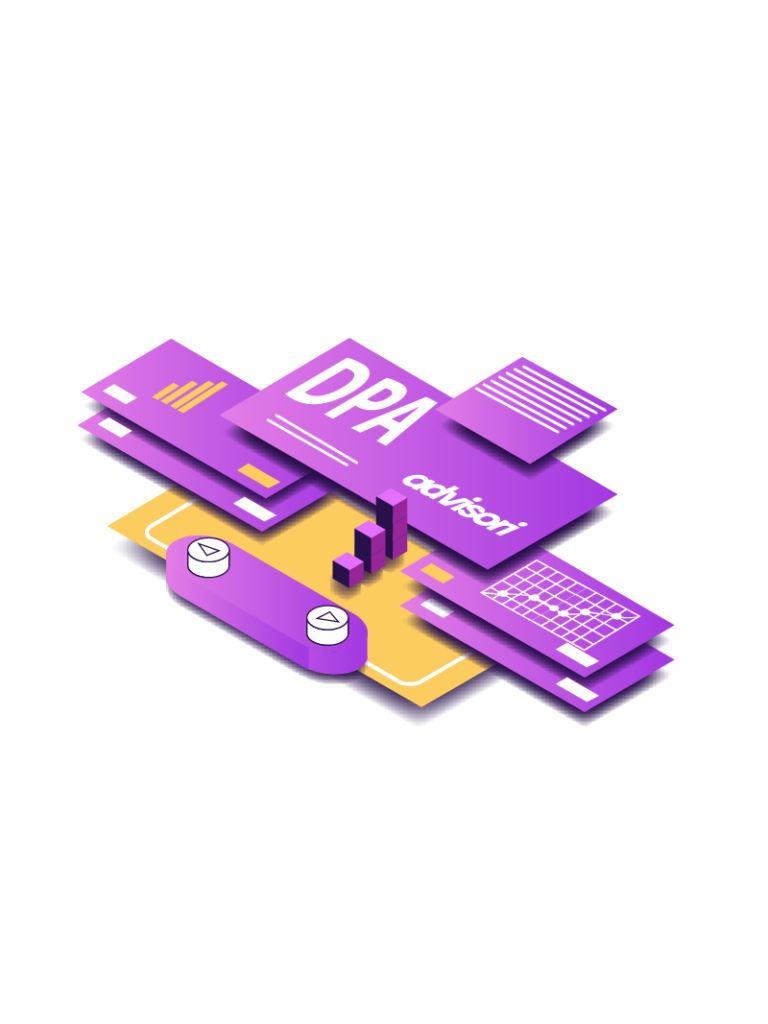
Data Protection Agreement Negotiation Services
Navigating data protection agreement (“DPA”) negotiations can be a complex and time-consuming process. By leveraging our services, your business can streamline this process, minimize risks, and achieve efficient and effective DPA negotiations. Our comprehensive review, tailored templates, negotiation support, and compliance monitoring will enable you to protect sensitive data and comply with data protection regulations. Contact us today to discuss how we can support your organization in facilitating data protection agreement negotiations.
What We Do
Advisory and Consultation Services: Our team of experienced privacy professionals can provide expert advice and consultancy on data protection agreement negotiations. We can help you understand the legal and regulatory requirements, identify key risks and challenges, and provide guidance on best practices.
Comprehensive DPA Review: Our team of skilled professionals will thoroughly review your existing DPAs to identify any gaps or areas of improvement. We will assess the adequacy of your DPA clauses, data transfer mechanisms, security measures, and other key elements, ensuring compliance with relevant data protection regulations such as GDPR, CCPA, and others. This review will serve as the foundation for improved negotiations and increased data protection.
Draft Tailored DPA Templates: To streamline negotiations, we can develop standardized DPA templates that align with your organization’s specific privacy requirements and industry practices. These templates will incorporate robust clauses, such as data minimization, breach notification procedures, audit rights, and data subject rights, while ensuring compliance with relevant regulations. By having pre-approved templates, you can significantly reduce negotiation time and effort.
Negotiation Support: Our experienced legal team can provide comprehensive support throughout the negotiation process. We will work closely with your legal team to review and analyze counterparty DPAs, identify potential issues, and propose solutions. Our expertise in data protection regulations and industry best practices will enable us to effectively advocate for your organization’s interests while maintaining a collaborative approach. We will assist in addressing any concerns or discrepancies, ensuring that the final DPA is fair, balanced, and in compliance with all relevant data protection laws.
Compliance Monitoring: Once the DPA negotiations are complete, our services extend beyond the agreement itself. Our team will help you establish robust monitoring processes to ensure ongoing compliance with the agreed-upon terms. We will provide guidance on implementing necessary security measures, conducting regular audits, and monitoring data transfers to identify and mitigate any potential risks. This proactive approach will help your organization maintain a strong data protection posture.
Training and Education: We offer training programs and workshops to enhance the knowledge and skills of your staff involved in data protection agreement negotiations. These programs cover essential topics such as legal requirements, negotiation strategies, and effective communication techniques to ensure that your team is well-equipped to handle data protection negotiations.

Our Process
Identify the Parties: First, we clearly identify the parties involved in the agreement, including the data controller (business), the data processor (service provider), and any other relevant third parties.
Define Scope and Purpose: Clearly articulate the scope and purpose of the data protection agreement. This includes specifying the types of personal data involved, the processing activities to be performed, and the intended purposes for which the data will be used
Determine Legal Basis: Establish the legal basis for processing personal data. This could include obtaining consent from data subjects, fulfilling contractual obligations, complying with legal requirements, or pursuing legitimate interests.
Outline Data Protection Obligations: Specify the data protection obligations of each party. This should cover key aspects such as data security measures, data breach notification procedures, data retention periods, and the rights of data subjects.
Allocate Responsibilities: Clearly allocate responsibilities between the data controller and the data processor. The data controller typically determines the purpose and means of processing, while the data processor carries out the processing activities on behalf of the data controller.
Address International Data Transfers: If personal data will be transferred to countries outside of the data subject’s jurisdiction, ensure compliance with applicable cross-border data transfer regulations. Consider implementing appropriate safeguards such as Standard Contractual Clauses or Binding Corporate Rules.
Include Indemnification and Limitation of Liability: Include provisions for indemnification and limitation of liability to protect both parties in the event of a data breach or other legal issues.
Establish Data Breach Response Plan: Develop a detailed data breach response plan that outlines the steps to be taken in the event of a data breach, including notification requirements, investigation procedures, and mitigation measures.
Decide the Appropriate Dispute Resolution Mechanism: Determine the method for resolving disputes that may arise during the agreement, such as mediation, arbitration, or litigation.
Contemplate Termination Clauses: Establish conditions under which the data protection agreement can be terminated, including breach of obligations, expiration of the agreement, or mutual agreement.
Review and Approval: Once the data protection agreement is drafted, it should be reviewed by legal teams from both parties. Any necessary revisions should be made and the final version should be approved by the respective parties.
Monitoring and Compliance: After the data protection agreement is in place, it is important to continuously monitor and ensure compliance with the agreed-upon obligations. Regular audits and assessments should be conducted to identify any potential compliance gaps and take corrective actions.
The Necessity of Quality Data Protection Agreements
Data protection agreement negotiations play a crucial role in ensuring that organizations comply with data protection regulations and safeguard the privacy of individuals. Here are some reasons why organizations should invest in this process:
Legal Compliance: Data protection agreements are essential for organizations to comply with various data protection laws and regulations, such as the General Data Protection Regulation (GDPR) in the European Union or the California Consumer Privacy Act (CCPA) in the United States. By negotiating and implementing these agreements, organizations demonstrate their commitment to protecting personal data and avoiding legal penalties.
Risk Mitigation: Data protection agreements help mitigate the risks associated with data breaches and unauthorized access to sensitive information. By clearly outlining the responsibilities and obligations of both parties involved in data processing, organizations can minimize the potential for data mishandling or misuse.
Trust and Reputation: Demonstrating a commitment to data protection through negotiations and agreements enhances an organization’s reputation and builds trust with customers and stakeholders. It shows that the organization values privacy and takes proactive steps to protect personal data.
Clarity and Consistency: Negotiating data protection agreements ensures that there is clarity and consistency in how personal data is handled and processed. It establishes clear guidelines and expectations for both parties involved, reducing the chances of misunderstandings or disputes in the future.
Competitive Advantage: Having robust data protection agreements in place can provide a competitive advantage for organizations. In today’s digital age, data privacy is a growing concern for individuals and businesses alike. Customers are becoming more aware of the importance of their personal data and are increasingly seeking out organizations that prioritize data protection. By investing in data protection agreement negotiations, organizations can differentiate themselves from competitors by showcasing their commitment to privacy and data security.

We can handle all you Data Protection Agreement Needs.
Are privacy attorneys have negotiated thousands of Data Protection Agreements for a wide-range of companies.
Don’t wait to get started.
Reach out to our team to learn more.